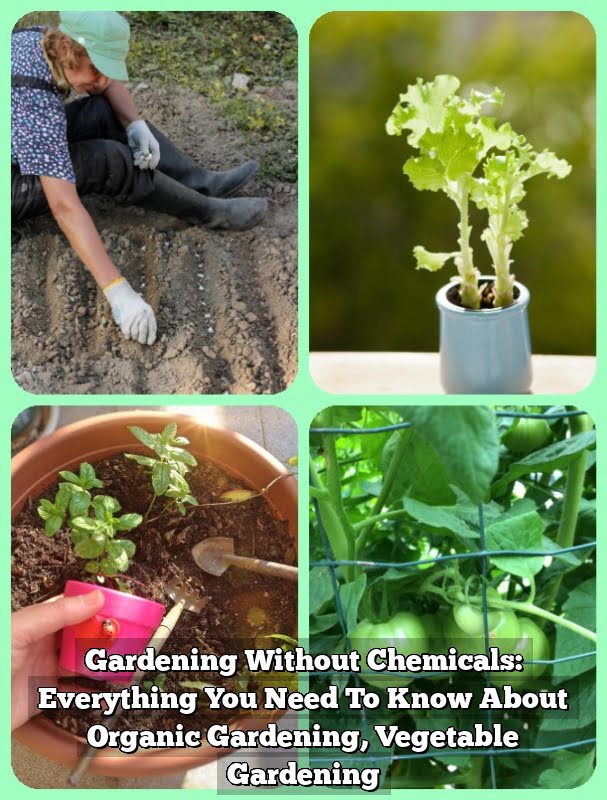Are you a renter who is interested in getting into vegetable gardening but not sure where to start? Vegetable gardening when renting can be a fulfilling and rewarding experience, allowing you to enjoy the benefits of homegrown produce even in a temporary living situation.
In this article, we will explore the various aspects of vegetable gardening for renters, from choosing the right containers and vegetables for your rental space to dealing with potential landlord restrictions. Whether you have limited outdoor space or are looking for a portable garden solution, we have got you covered with tips and advice on how to embrace the joy of vegetable gardening while renting.
When it comes to renting, many individuals may feel limited in their ability to create a thriving vegetable garden. However, with the right approach and knowledge, it is entirely possible to grow a variety of delicious vegetables even in rental spaces.
From balcony gardens to small patios, there are numerous options available for renters to cultivate their own fresh produce. By understanding how to maximize limited space and work within potential restrictions, renters can still enjoy all the benefits that come with vegetable gardening.
In addition to providing an excellent source of fresh and nutritious produce, vegetable gardening offers numerous health and wellness advantages. Not only does it promote physical activity and a healthy lifestyle, but it also provides mental and emotional benefits.
The act of caring for plants and watching them grow can be incredibly therapeutic, making vegetable gardening an ideal hobby for renters looking to create a sense of home in their temporary living spaces. Throughout this article, we will delve into the various ways in which vegetable gardening can enrich your life as a renter while also providing practical tips for getting started on your own garden journey.
Choosing the Right Containers for Your Rental Space
When you are renting a home or apartment, one of the challenges you may face with vegetable gardening is the limited outdoor space. However, there are solutions to this problem, and one of them is container gardening. This method allows you to grow your own vegetables without having to worry about having access to a large yard or garden.
When it comes to choosing the right containers for your rental space, there are a few factors to consider. First, think about the size of the containers – they should be large enough to accommodate the root systems of the vegetables you want to grow. Additionally, consider the material of the containers.
Plastic, terra cotta, and wooden containers are all popular choices for vegetable gardening in a rental space. Lastly, don’t forget about drainage – make sure that whatever container you choose has adequate drainage holes at the bottom.
It’s also important to consider the weight of the containers if you’re living in an apartment building or upper floor unit. Many renters opt for lightweight plastic or resin pots for their vegetable gardens because they are easier to move around when needed.
| Container Type | Advantages |
|---|---|
| Plastic | Lightweight and easy to move |
| Terra Cotta | Natural look and allows for proper airflow |
Selecting the Ideal Vegetables for Container Gardening
When it comes to vegetable gardening in a rental space, choosing the right vegetables is essential. Not all vegetables are suitable for container gardening, so it’s important to select those that thrive in limited space and do well in pots.
Best Vegetables for Container Gardening
Some of the best vegetables for container gardening include tomatoes, peppers, lettuce, spinach, and herbs such as basil, parsley, and mint. These plants adapt well to container growing and can produce a bountiful harvest even in a small rental space. Additionally, radishes, carrots, and green onions are root vegetables that can also be grown in containers given their moderate size requirements.
Factors to Consider
Consider the climate of your rental location when selecting vegetables for your container garden. Some vegetables may thrive better in warmer weather while others do well in cooler temperatures. Also, take into account the amount of sunlight your rental space receives as this will impact the growth of your vegetable plants.
Combination Planting
Another strategy to maximize your container garden is to practice combination planting – planting different types of vegetables together in one large container. For example, pairing tomatoes with basil and marigolds can help deter pests and enhance each other’s growth. This technique allows renters to make the most out of their limited space by inter-planting compatible crops.
By choosing the right vegetables for container gardening based on these factors, renters can enjoy a successful and fruitful garden even within the confines of their rental property.
Tips for Maximizing Limited Space in a Rental
When renting a home, space is often limited, making it challenging to create a vegetable garden. However, with the right strategies and tools, renters can maximize their limited space to build their own thriving vegetable garden. In this section, we will explore some tips for renters to make the most of their limited space for vegetable gardening.
Utilize Vertical Space
In a rental with limited outdoor space, utilizing vertical space can significantly increase the available gardening area. Consider installing trellises, hanging planters, or vertical gardening systems to grow climbing vegetables like tomatoes, cucumbers, and beans. This method not only saves valuable ground space but also creates an attractive green wall effect in your rental space.
Opt for Compact Varieties
When selecting vegetables for your container garden in a rental home, opt for compact varieties that are well-suited for small spaces. Look for dwarf or bush varieties of popular vegetables such as cherry tomatoes, peppers, and zucchini. These smaller plants require less room to grow while still yielding a bountiful harvest.
Implement Succession Planting
Succession planting involves growing multiple crops in the same containers throughout the growing season. As soon as one crop is harvested, another is planted in its place. This method allows renters to continuously utilize their limited gardening space and maximize the productivity of their container garden.
By implementing these tips and techniques, renters can effectively maximize their limited outdoor space for vegetable gardening. With creativity and resourcefulness, even renters with minimal outdoor areas can enjoy the benefits of homegrown produce and experience the satisfaction of nurturing a thriving vegetable garden.
The Importance of Watering and Sunlight in Vegetable Gardening
When it comes to vegetable gardening, perhaps the two most critical factors for success are having the right amount of water and sunlight. Whether you have a backyard garden or are practicing vegetable gardening when renting an apartment, proper watering and adequate sunlight are essential to growing healthy and thriving crops.
First and foremost, understanding the specific watering needs of the vegetables you are growing is crucial. Some plants require daily watering, while others may only need to be watered every few days. For renters who may have limited access to outdoor water sources, utilizing self-watering containers can be a practical solution to ensure that your vegetables are consistently hydrated, especially during hot summer months.
In addition to watering, providing sufficient sunlight is equally important for vegetable gardening success. Most vegetables require at least 6-8 hours of direct sunlight per day to thrive.
In rental properties with limited outdoor space, consider placing your container garden in a location that receives ample sunlight throughout the day, such as a balcony or patio. If direct sunlight is scarce, some vegetables can still grow in partial shade, so be sure to choose plants that are suitable for the amount of sunlight available in your rental space.
Dealing With Potential Landlord Restrictions
When renting a home, tenants often face restrictions set forth by their landlords, and this can impact the ability to start a vegetable garden. Before beginning any gardening project, it is essential to review the terms of your lease agreement to ensure you are within your rights as a tenant.
Some landlords may have specific rules about altering the property, such as not allowing any outdoor planting or modifications to the landscaping. It is crucial to communicate openly with your landlord about your intentions and seek permission if necessary.
In some cases, landlords may be open to negotiating certain restrictions if approached respectfully and responsibly. If outdoor gardening is prohibited, consider proposing alternate solutions such as creating a portable garden that can be easily moved when necessary. By having an open dialogue with your landlord and presenting potential compromises, renters may find solutions that allow them to pursue their passion for vegetable gardening while respecting the terms of their lease agreement.
One alternative solution for dealing with potential landlord restrictions is to focus on indoor or container gardening. Many vegetables can thrive in pots, planters, or other containers placed on balconies or patios. By selecting suitable plants and utilizing appropriate containers, renters can still enjoy the benefits of growing their own produce without violating any lease agreements. Overall, being mindful of potential restrictions and approaching them thoughtfully can lead to successful vegetable gardening experiences for renters.
| Landlord Restrictions | Effect |
|---|---|
| Potential limitations on outdoor gardening | Impacts ability to grow vegetables in traditional garden beds |
| Possibility of negotiating outdoor gardening restrictions | Communication with landlord may lead to compromises |
| Focusing on container gardening as an alternative | Allows renters to pursue vegetable gardening within lease guidelines |
How to Create a Portable Garden for Renters
When renting a home, it’s important to take advantage of the space you have for vegetable gardening. Creating a portable garden allows renters to enjoy the benefits of growing their own produce without making permanent changes to the property. There are several options for creating a portable garden that is both functional and aesthetically pleasing in a rental space.
One way to create a portable garden for renters is by using moveable containers or planters. This allows you to rearrange your garden as needed and even bring it with you when you move to a new rental property. Look for lightweight, durable containers that can withstand different weather conditions and are easy to transport. Additionally, using hanging planters or vertical gardening systems can help save space and make it easier to move your garden if necessary.
Another option for renters looking to create a portable garden is to use fabric grow bags or modular gardening systems. These can be easily folded up and moved, making them ideal for renters who may need to relocate in the future. These types of gardening systems are also versatile and can be used on balconies, patios, or even indoors if outdoor space is limited.
For renters with limited outdoor space, creating a portable garden indoors may be the best option. Utilizing windowsills, countertops, or shelves for small potted plants or herb gardens can bring fresh produce into your rental home without taking up valuable outdoor space.
Indoor herb gardens are not only practical but also add natural beauty and aroma to your living space. Whether you choose movable containers, fabric bags, modular systems, or indoor plantings, creating a portable garden as a renter allows you to enjoy the experience of vegetable gardening while maintaining flexibility in your living situation.
The Advantages of Vegetable Gardening for Health and Wellness
Vegetable gardening can provide numerous benefits for both physical and mental well-being, making it a valuable activity for renters looking to enhance their health and wellness. Here are some advantages to consider:
1. Stress Reduction: Engaging in vegetable gardening can be a therapeutic and stress-relieving activity. The act of caring for plants and watching them grow can provide a sense of accomplishment and relaxation, ultimately reducing stress levels.
2. Nutritional Benefits: Growing your own vegetables allows you to have access to fresh, organic produce right at your fingertips. This can lead to an improved diet with higher intake of essential vitamins and minerals, contributing to overall health and wellness.
3. Physical Activity: Vegetable gardening involves physical labor such as digging, planting, and watering, which provides a form of moderate exercise. This regular physical activity is beneficial for maintaining a healthy lifestyle.
Additionally, spending time outdoors while tending to a garden can provide exposure to sunlight, increasing vitamin D levels which is important for bone health and immune function. These are just some of the many ways in which vegetable gardening can contribute to overall health and wellness, making it an attractive option for renters looking to improve their quality of life.
Whether you have limited space or no outdoor area at all due to renting a home or apartment, there are ways in which you can still enjoy the benefits of vegetable gardening. By utilizing containers or creating portable gardens, renters can partake in this rewarding activity regardless of their living situation.
Conclusion
In conclusion, vegetable gardening provides numerous benefits for renters, from access to fresh produce to a sense of pride and accomplishment. The ability to control the quality of your food and reduce grocery expenses are just a few advantages that come with cultivating your own vegetables. With the right containers, proper plant selection, and strategic use of limited space and resources, renters can embrace the joy of vegetable gardening regardless of their living situation.
Furthermore, addressing potential landlord restrictions is a crucial but manageable aspect of vegetable gardening when renting. By understanding and following any guidelines set forth by your landlord or property management company, you can ensure a harmonious relationship while still enjoying the benefits of cultivating your own vegetables. Creating a portable garden allows renters to easily move their plants if needed or if they relocate to another rental property.
Ultimately, vegetable gardening offers not just physical health benefits but also mental and emotional wellness advantages. Engaging in this activity fosters a sense of connection to nature and brings about a therapeutic effect for many individuals.
Whether it’s the act of planting seeds or watching plants grow and flourish, vegetable gardening in a rental home can be an incredibly fulfilling experience that contributes to overall well-being. So don’t let the limitations of renting discourage you – embrace the joy of vegetable gardening and enjoy all its rewards while living in a rental property.
Frequently Asked Questions
Can You Have a Vegetable Garden in an Apartment?
Yes, you can have a vegetable garden in an apartment! You can use containers or vertical gardening techniques to maximize space. Consider growing herbs, tomatoes, peppers, and lettuce indoors or on a balcony.
Does a Vegetable Garden Save You Money?
A vegetable garden can save you money in the long run. By growing your own produce, you can reduce grocery expenses and have a constant supply of fresh, organic vegetables. Additionally, you’ll save on gas or transportation costs to buy produce at the store.
How Can I Make My Backyard Rental Nice?
To make your backyard rental nice, start by adding some greenery with potted plants or hanging baskets to create a cozy atmosphere. Consider adding outdoor furniture for seating and relaxation. Lighting options such as string lights or lanterns can also add charm to the space. Lastly, consider adding a small vegetable or flower garden to enhance the outdoor space.

If you’re looking to get into vegetable gardening, or are just looking for some tips on how to make your current garden better, then you’ve come to the right place! My name is Ethel and I have been gardening for years. In this blog, I’m going to share with you some of my best tips on how to create a successful vegetable garden.





